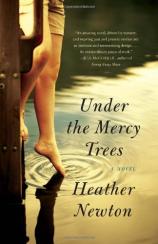Reading Group Guide
Discussion Questions
Under the Mercury Trees

1. Of the four narrators --- Martin, Liza, Bertie and Ivy --- who was your favorite? Why?
2. The scene in which Martin remembers his childhood Baptism ends with: "In particularly drunk moments since then, he had wished he could do it again. He could use a wash now, a good soak or scrub, to remove all the sins he'd accumulated. But God only lets you go under one time." What does this say about how Martin feels about himself? By the end of the novel, how have the other characters helped Martin come to terms with his feelings of failure and regret?
3. As the story unfolds, we learn of Leon's past wrongs–beating Martin as a child, blackmailing Mr. Samuels, "selling" Ivy for a half pack of cigarettes. Before (and after) he disappears, what attempts does Leon make to set these past wrongs right? Do you feel he succeeds in making amends? What do you think Leon would say for himself if he could speak?
4. Bertie describes her sense of loss at moving from youth to middle age as, "It happened so fast. One day, one minute, even, she was getting the up-and-down from the boys at Riddle's general store. The next, nobody was looking at her anymore." What do you think it takes to live happily in middle age --- something Bertie has not been able to do?
5. Ivy sees ghosts. Do you think this is a suggestion that ghosts are real or simply a literary device? Why do you think Newton chose to have Ivy see ghosts? What do the scenes with the ghosts add to the novel?
6. Under the Mercy Trees is tangled with secrets. What do you think of the characters' choices about whether to tell --- or not tell --- their secrets?
7. Liza's husband Raby says to Martin, "Boy, you know how it is with certain people in your life. People you knew when you were young, when the cracks to your heart were still open." Does this statement ring true for you? Are their people from your childhood–friends or old loves --- who remain important to you?
8. Newton uses scenes from the past to show the young Martin's emerging awareness of his homosexuality. How does Martin's sexual orientation increase his sense of alienation from his family and from his rural roots in general? Do you think that Martin would still have felt like a misfit in his family and place of origin even if he were not gay? In what other ways can someone feel like an outsider in a family?
9. Hodge never seems to judge Martin, even though Martin repeatedly disappoints him. Does Martin deserve such forgiveness? Why or why not?
10. Newton has said that what she likes most to write about is human regret. What burdens are Martin, Liza, Bertie and Ivy able to lay down by the end of the novel?
11. Flannery O'Connor once said, "I think it is safe to say that while the South is hardly Christ-centered, it is most certainly Christ-haunted." What role does Christian belief play in Under the Mercy Trees? How do the different religious expressions of Hodge and Eugenia highlight the novel's themes of forgiveness and redemption?
12. Certain objects in the novel are important to the characters --- Liza's Ford Sunliner convertible, Leon's knuckle knife, the ledger that belonged to Martin's mother, the photograph of Martin and Liza at their high school graduation. Why are these items significant? Do you own a particular object that has emotional significance for you? Why is it special?
13. Two locations significant to the novel are Ivy's "special place" and the grove of storm-bent trees. What role do these places play in the novel? Why do you think Newton chose the title Under the Mercy Trees?
Under the Mercury Trees
- Publication Date: January 18, 2011
- Paperback: 352 pages
- Publisher: Harper Perennial
- ISBN-10: 0062001345
- ISBN-13: 9780062001344







